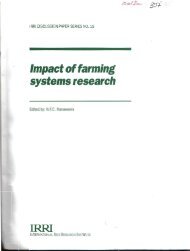Naz, Antonia Corinthia C and Mario Tuscan N. Naz. 2006. Modeling ...
Naz, Antonia Corinthia C and Mario Tuscan N. Naz. 2006. Modeling ...
Naz, Antonia Corinthia C and Mario Tuscan N. Naz. 2006. Modeling ...
Create successful ePaper yourself
Turn your PDF publications into a flip-book with our unique Google optimized e-Paper software.
MODELING CHOICES FOR ECOLOGICAL SOLID WASTE MANAGEMENT<br />
IN SUBURBAN MUNICIPALITIES: USER<br />
FEES IN TUBA, PHILIPPINES<br />
Dr. <strong>Antonia</strong> <strong>Corinthia</strong> C. <strong>Naz</strong> <strong>and</strong> <strong>Mario</strong> <strong>Tuscan</strong> N. <strong>Naz</strong><br />
EXECUTIVE SUMMARY<br />
The Philippines’ Republic Act (RA) 9003 or the Ecological Solid Waste<br />
Management (ECOSWAM) Act m<strong>and</strong>ates local government units (LGUs) to formulate<br />
<strong>and</strong> implement their ECOSWAM plans. This law sets very ambitious goals, <strong>and</strong> their<br />
achievement will be a major challenge for all sectors of the society. It bans the use of<br />
open dumps <strong>and</strong> requires all LGUs to use only sanitary l<strong>and</strong>fills by year <strong>2006.</strong><br />
Compliance with the law implies that the Philippines will need to spend an additional<br />
PhP 150 billion (USD 3 billion) for the next 10 years. Many local governments are in a<br />
dilemma on how to fund these services. Hence, this study assisted the Tuba municipal<br />
government in Benguet province, to examine how to finance the costs of ECOSWAM<br />
services through garbage or user fees. It also provided inputs for Tuba’s ECOSWAM<br />
plan. This EEPSEA study is the first one in the Philippines that used the choice<br />
modeling method of contingent valuation to examine the dem<strong>and</strong> for ECOSWAM<br />
services in a suburban, rapidly urbanizing area.<br />
The study revealed that the people of Tuba ranked solid waste management as the<br />
number one environmental problem but they were not willing to pay a high price to help<br />
address this problem. They were willing to pay user fees that could cover only about 22<br />
to 35 percent of the costs of ECOSWAM services. Households were willing to pay an<br />
additional PhP 17 (USD 0.30) per month above the base case (the option that meets the<br />
minimum requirements of RA 9003), for the option wherein their waste is collected<br />
twice a week. This is roughly equivalent to three-fourths of a kilo of rice. Business<br />
establishments were willing to pay an additional PhP 4 (USD 0.08) per sack of waste or<br />
PhP 17 (USD 0.30) per month above the base case, for their waste to be collected twice<br />
a week <strong>and</strong> a similar amount for their waste to be collected by the municipal workers<br />
with a garbage truck. This amounts to about 1.2 liters of gasoline that they were willing<br />
to forego in order to pay for ECOSWAM services.<br />
The study recommends that the Tuba municipal government adopt the option with<br />
the lowest funding gap, the lowest maintenance <strong>and</strong> operating costs <strong>and</strong> the highest cost<br />
recovery. This is scenario 1, characterized by once a week collection of residual waste<br />
by municipal workers with a garbage truck. Even with user fees, this option will still<br />
cost the Tuba municipal government at least PhP 2 million yearly for maintenance <strong>and</strong><br />
operating expenses. This implies that the Tuba municipal government will have to slice<br />
off as much as 25 percent from its development fund to provide these services. If no<br />
user fees are collected, it will have to spend about 40 percent of its development fund or<br />
15 percent of its total budget for these services. It will then have to make trade-offs<br />
between ECOSWAM services <strong>and</strong> other social services such as education, health <strong>and</strong><br />
basic infrastructure.<br />
The study recommends that local governments seriously consider charging user<br />
fees to finance, even, partially, the costs of ECOSWAM services. For economic<br />
1
















